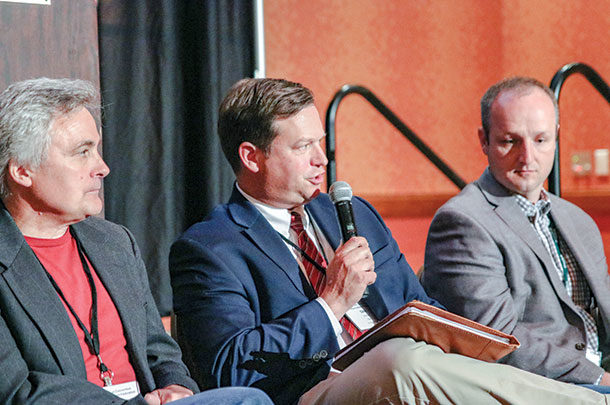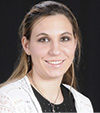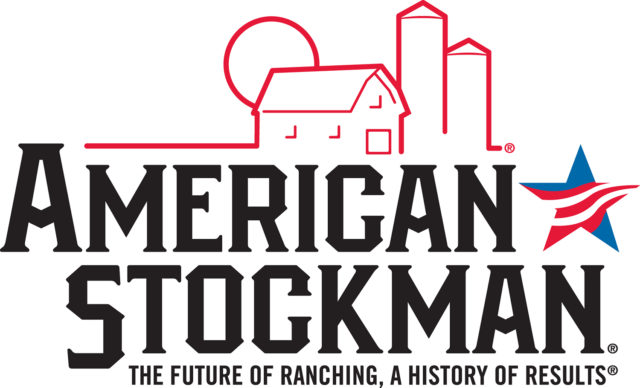The panel included cattlemen from different parts of the industry who gave their insights on “Who Owns Your Data, and Where is It?” As the cattle world becomes more technologically advanced, more data is able to be collected, stored and processed. This is especially important in terms of genomic data. Over time, this topic is becoming more and more relative to cattlemen. The following discussion gave attendees important information, background and concerns about data in the modern beef industry.
The first to speak was John Genho, owner and geneticist of Livestock Genetic Services LLC. His work involves running genetic evaluations for commercial ranches and working with 10 different breed associations. He opened by drawing a comparison of breed associations’ data to using Google Maps on a smartphone for directions. Google’s server works as it processes traffic data from all the contributors on the road to alert for clear or slowed roads.
“It’s really pretty similar to the breed association model,” he said. “You have a lot of individuals contributing data, and breeders can see some of that data, but everyone benefits from everyone else sharing that.”
He shared some of his personal experience and observation on how partnership and partial data sharing of private information can allow for benefits of multiple parties.
“I started working with King Ranch 15 years ago to develop a genetic evaluation program for traits they did not have EPDs for,” Genho said. “They have a whole selection of traits they are selecting for and now have a symbiotic partnership with Santa Gertrudis Breeders International.”
Wade Shafer, executive vice president of the American Simmental Association, did not always pay attention to data rights and ownership. He acknowledged a lot of fellow cattlemen are probably similar to him in that regard.
“After all, we grew up in the beef industry and, in the beef industry, we had universities, land-grant universities, extension services, breed associations and the USDA. Those organizations provided cutting-edge technology and information, pretty much free-flowing information,” Shafer explained. “Now, a few years ago, I have to say I became keenly aware of things like intellectual property rights … this is very important in our industry. My personal bent is: I would like to see our industry maintain this open and free-flowing type of platform. That said, the fact that intellectual property rights are important, they spur innovation.”
Working for both ASA and International Genetic Solutions (IGS), he noted there are some misconceptions about what IGS does. He defined it as being a collaboration among different breed associations for commercial cattle with 17 million animals in its database. Recently, in 2017, there was a transition to a new software program, called BOLT, that has been in progress since 2014. He left the audience with this thought, “We need to continue to make progress, but I would hope we are able to find that reasonable balance between open-source data and innovation.”
Next was Matt Cleveland of Genus ABS, who expressed the importance of collecting, storing and providing data to benefit the industry and increase profitability. To do this, economic and production traits must be stressed.
“The biggest challenge for us and, I think the whole industry, is how do we ensure we’re collecting the data that’s for economic development traits?” he said.
ABS collects data in over 70 different countries for both dairy and beef cattle. As more dairy producers invest in beef semen to increase the value in some of their animals, those new lines of data must continue to grow and develop and be put in the system. Cleveland commended the beef industry in using an intentional approach to its data collection and applying that data to genomic decisions for breeding.
These sentiments were echoed by Larry Benyshek of Benyshek and Hough Consulting Services.
“I’ve been able to see changes in this industry, and we need to understand we have made significant changes in genetic improvement in the cattle business,” he said. “We have become consumer-driven; consumers reign supreme.”
To do this, the industry must continue to improve the way data is not only collected but also implemented. “We want to see that data turned into information,” Benyshek said. “Most of the time it’s relatively easy to determine who owns the data. It’s usually a lot harder to find where it is, but it is out there.” One of his solutions to make this process more efficient is a software program he helped develop, Benyshek’s Genetic and Economic Management (GEM).
This data management program is utilized by a few hundred thousand users and contains both public and private sectors. The goal is to gather and archive data for use when it’s needed. The system can store all kinds of information including production, sale and medical. It helps genetic data flow more freely across different industry sectors.
Rounding out and concluding the open panel was Dan Moser, current president of Angus Genetics Inc (AGI). AGI is owned by the American Angus Association (AAA) and is the world’s leading provider of beef genetic information and delivers evaluation services to multiple breeds.
“When I think about this subject, a word that comes to mind is stewardship,” he told the audience. “And I think that’s a word a lot of you connect with very well.”
Members of the AAA have been very proactive and made a significant investment in data recording. The association shares ownership of the phenotypes with submitting members’ 500,000 genotypes in a weekly evaluation. Over 1 million samples used for collection are held in an archive at the association’s headquarters. Moser feels strongly the AGI genotype policy, which allows them the ownership and transfer of data, serves the best interest of both the membership and the beef industry at large.
“Our job as stewards of that is to provide as much return for that investment as we can back to them and to also preserve that resource for the future,” said Moser. “We think about today, but we also think about tomorrow.” ![]()
PHOTO: From left to right: Wade Shafer, Dan Moser and John Genho were three of the five panelists at last year’s Beef Improvement Federation Conference to discuss data in the modern beef industry. Photo by Angela Denton.
Jaclyn Krymowski is a freelance writer based in Ohio.











